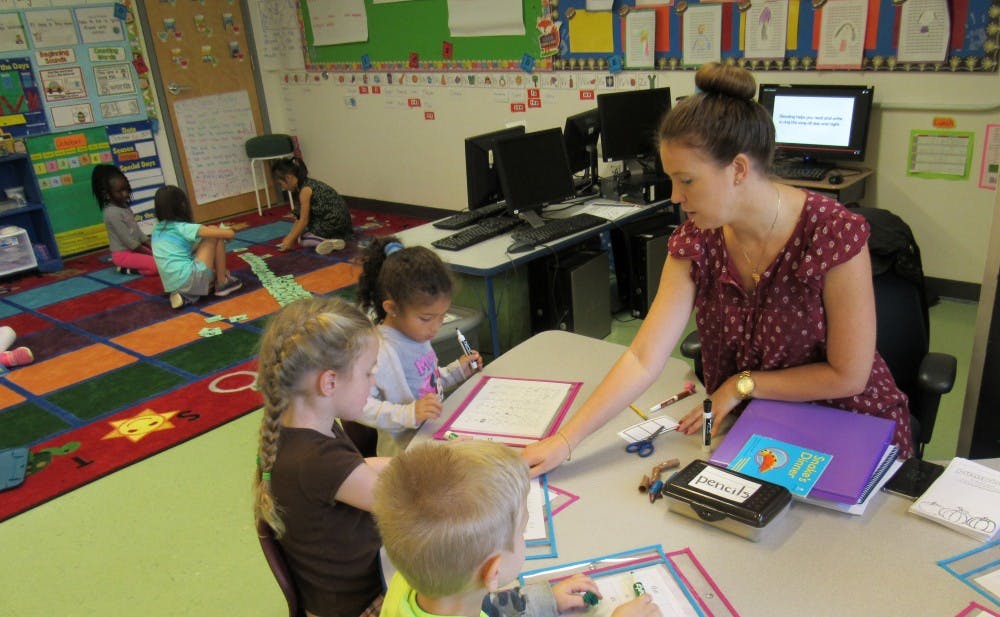
Disputes between curriculumists and non-curriculumists over the governance of schools in Princeton continue.
In the last decade, the school community has been wracked by bitter disputes over the educational goals and governance of the schools, according to former member of the Princeton Public School school board Chiara Nappi in 1999.
Writing as a self-proclaimed concerned Princeton parent after her tenure on the board, Nappi was referring to the tension between the curriculumists and non-curriculumists in the community. The so-called curriculumists sought a uniform course of study that would ensure coordination among grade levels, “where lessons learned in one grade were built on in the next.”
These values were largely rejected by the non-curriculumists, who were parents and teachers preferring a less structured approach, where educators had freedom to “teach children, not curricula,” Nappi said. These two groups held competing visions on what it meant to improve schooling.
It’s been more than twenty years since the curriculumists forwent trying to change the public school system from within, opening the Princeton Charter School (PCS) instead.
According to Nappi, PCS was founded by parents who believed in higher academic standards and stronger teacher-student accountability than what was offered in the public school system.
Before the passage of the New Jersey Charter School Program Act of 1995, which authorized the establishment of charter schools in the state, curriculumists furthered their reform efforts by attempting to obtain a majority on the Princeton Board of Education. Nappi, one of the curriculumists who secured a seat at the time, said the minority non-curriculumist faction was able to impede majority motions while simultaneously, however, “crippling the Board of Education” and any chance of reform that aligned with the curriculumist agenda.

The passage of the 1995 legislation provided the curriculumists with a timely alternative to circumvent the public school system entirely. They redirected their efforts towards founding PCS and were presented with a charter in 1997, along with eight other New Jersey charters, Nappi said.
The opening of PCS fed the “us v. them” narrative between the curriculumists and non-curriculumists, accentuating the divide between those who were satisfied with the local public school system and those who weren’t, Nappi said.
More than 20 years later, relations between PCS and the Princeton Public School (PPS) system are still contentious.
PPS is currently suing PCS for violating New Jersey’s Open Public Meeting Act, known as “the sunshine law,” during a meeting about expanding the student body of PCS by 76 students, head of PCS Lawrence Patton said in an interview with the 'Prince.'

According to the NJ Chapter of the Society of Professional Journalists, the sunshine law is “designed to ensure that decision-making government bodies in the state conducts their business in public.”
The application process for conducting the meeting required applications be sent to the school district affected, so the public was adequately informed about what was going on, Patton explained.
“In the event that we may have made a violation, we cured any oversights in that,” said Patton. “We’re not trying to act in any inappropriate way.”
The Acting Education Commissioner Kimberley Harrington approved PCS’s move to expand despite the alleged violations, a decision that incited an additional lawsuit when PPS challenged the ruling.
“Nobody has ever successfully challenged expansion,” President of the PCS board of trustees Paul Josephson said in an interview with the 'Prince.' Josephson thinks the lawsuits may be intended to discourage PCS expansion in the future, something PCS does not plan on doing.
Copies of court records reveal the total cost of litigation paid by both parties exceeds $400,000.
“It’s an outrage,” said Patton. “Taxpayer money that should be going to the education of children is going to the pockets of lawyers.”
Two factors provoke conflicts between Princeton’s public and charter schools, Josephson said. On one hand, it’s a pure policy matter:
“We need a separate stream of funding,” said Josephson, of PCS. “A financial system that doesn’t pit the two of us against each other.”
Funding for charter schools rests on the principle that the money should follow the child, Josephson said. If a student from the public school district enrolls in a charter school, the public school district has to pay the charter school to educate the child. Thus, taxpayer dollars that would otherwise go to the students at PPS are redirected towards PCS, a point of contention among many community members.
On the other hand, it’s a power struggle: the influence of the New Jersey Education Association (NJEA) on public education is huge, Josephson said. The NJEA is one of the most powerful political forces in the state of New Jersey and is concerned about the lack of collective bargaining mechanisms among charter school employees, Josephson said.
Compared to other states, New Jersey charter schools are low in number — under 100 — because of the complex approval process and the spread of misinformation by vocal members of the NJEA, Patton said.
“We are frustrated because we are educating children and, I think, doing a great job,” said Patton. “We want to minimize any and all divisiveness.”
In an interview with the 'Prince,' NJEA spokesperson Meredith Barnes offered a statewide perspective on the union’s position towards charter schools.
“There are good and not-so-good charter schools,” said Barnes. “After twenty years, let’s pause and reflect on whether this is the best approach or worst approach for public school students — if we look at other states that have had a huge increase in charter schools, they are not top three in the nation — New Jersey is. We don’t want to model after states that aren’t doing as well.”
The main item on the NJEA agenda regarding charter schools is amendments to the Administrative Code, specifically Title 6A, Chapter 11 on Charter Schools. These amendments were proposed by the state board of education. Some of the amendments would make the process of becoming a charter school teacher or administrator less rigorous than becoming a public school teacher or administrator, Barnes said.
“At the NJEA, we want to ensure the requirements are equivalent,” said Barnes. “Ultimately, we want to make sure that every student has an excellent teacher in front of the classroom and a safe and healthy environment in which to learn.”
In Princeton, there has been a long history of reasonable people disagreeing on what constitutes an improvement to schooling, and competing visions of the ideal educational system have created political divisions that surface at the state level. It’s become the “Princeton way.”
More than twenty years after her initial report covering events leading the opening of PCS, Nappi said, “I am surprised that with all the more important things to worry about these days, people put their energy to still fight PCS.”








